

New Alzheimer’s treatment fully restores memory function. Australian researchers have come up with a non-invasive ultrasound technology that clears the brain of neurotoxic amyloid plaques - structures that are responsible for memory loss and a decline in cognitive function in Alzheimer’s patients.
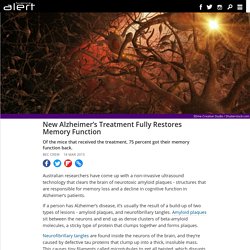
Scientists Connect Brain to a Basic Tablet—Paralyzed Patient Googles With Ease. For patient T6, 2014 was a happy year.
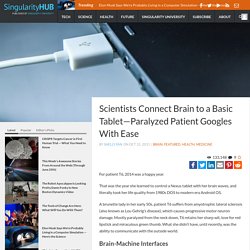
“The World in 2025″ Predicts Abundant Solar Power and Food, Tailored Drugs, Gene Therapies. In a recently released vision of the future, Thomson Reuters analysts predict solar power will be the dominant form of energy by 2025.

Further, the report states genomic testing and manipulation will be common and lead to better prevention and treatment of diseases. Cancer treatments will be more targeted and less toxic. The world’s infrastructure will be smart, connected, and responsive to our needs. We’ll no longer grapple with food shortages and price volatility. And scientists will begin experimenting with teleportation of stuff, if not humans. Stem cell 'major discovery' claimed. 29 January 2014Last updated at 06:52 ET By James Gallagher Health and science reporter, BBC News Stem cell researchers are heralding a "major scientific discovery", with the potential to start a new age of personalised medicine.
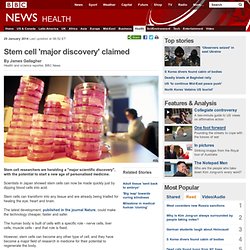
Scientists in Japan showed stem cells can now be made quickly just by dipping blood cells into acid. Stem cells can transform into any tissue and are already being trialled for healing the eye, heart and brain. The latest development, published in the journal Nature, could make the technology cheaper, faster and safer. The human body is built of cells with a specific role - nerve cells, liver cells, muscle cells - and that role is fixed.
However, stem cells can become any other type of cell, and they have become a major field of research in medicine for their potential to regenerate the body. Embryos are one, ethically charged, source of stem cells. Acid bath. Potential 'universal' blood test for cancer discovered. The Lymphocyte Genome Sensitivity (LGS) test looks at white blood cells and measures the damage caused to their DNA when subjected to different intensities of ultraviolet light (UVA), which is known to damage DNA.
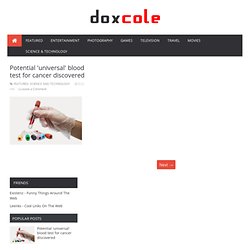
The results of the empirical study show a clear distinction between the damage to the white blood cells from patients with cancer, with pre-cancerous conditions and from healthy patients. (Stock image). Researchers from the University of Bradford have devised a simple blood test that can be used to diagnose whether people have cancer or not. The test will enable doctors to rule out cancer in patients presenting with certain symptoms, saving time and preventing costly and unnecessary invasive procedures such as colonoscopies and biopsies being carried out.
Alternatively, it could be a useful aid for investigating patients who are suspected of having a cancer that is currently hard to diagnose. The study looked at blood samples taken from 208 individuals. Story Source: Spray-On Nanofibres Bind Surgical Wounds. Polymer nanofibres can be sprayed onto surgical incisions, sealing them to prevent infection.
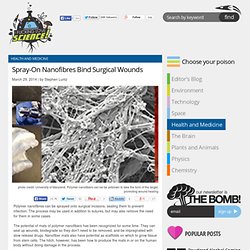
The process may be used in addition to sutures, but may also remove the need for them in some cases. The potential of mats of polymer nanofibers has been recognized for some time. Smart Artificial Skin Could Give Prosthetic Limbs Feeling. Scientists have created a smart prosthetic skin that’s stretchy and warm like real skin, and is jammed with tiny sensors that can pick up a variety of environmental cues such as heat, pressure and moisture.
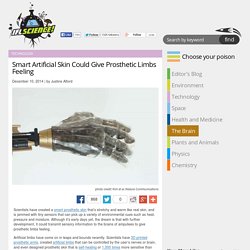
Although it’s early days yet, the dream is that with further development, it could transmit sensory information to the brains of amputees to give prosthetic limbs feeling. Artificial limbs have come on in leaps and bounds recently. Scientists have 3D printed prosthetic arms, created artificial limbs that can be controlled by the user’s nerves or brain, and even designed prosthetic skin that is self-healing or 1,000 times more sensitive than human skin. While these are all fantastic, the problem the devices tend to face is that they don’t enable the user to feel if something is dangerously hot, or whether the user is about to drop something because the grip is too soft. Kim et al, via MIT Technology Review [Via MIT Technology Review, Nature Communications PopSci and Live Science] New wonder drug matches and kills all kinds of cancer — human testing starts 2014.
Stanford researchers are on track to begin human trials of a potentially potent new weapon against cancer, and would-be participants are flooding in following the Post’s initial report on the discovery.
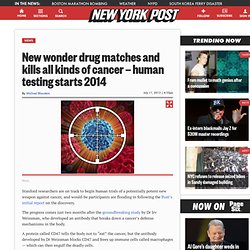
The progress comes just two months after the groundbreaking study by Dr Irv Weissman, who developed an antibody that breaks down a cancer’s defense mechanisms in the body. A protein called CD47 tells the body not to “eat” the cancer, but the antibody developed by Dr Weissman blocks CD47 and frees up immune cells called macrophages — which can then engulf the deadly cells.
The new research shows the miraculous macrophages effectively act as intelligence gatherers for the body, pointing out cancerous cells to cancer-fighting “killer T” cells. The T cells then “learn” to hunt down and attack the cancer, the researchers claim. Which New Technology Will Win the Race to Repair and Replace Our Organs? An extraordinary competition is underway—one that could be more impactful to the human species than any other technological rivalry to come before it.
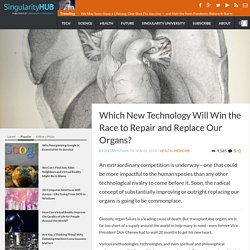
Soon, the radical concept of substantially improving or outright replacing our organs is going to be commonplace. Globally, organ failure is a leading cause of death. Scientists Develop Blood-Cleansing Artificial Spleen. Scientists Create Functioning Whole Organ From Cells. For the first time, researchers have been able to develop a functional thymus by using reprogrammed lab-created cells.
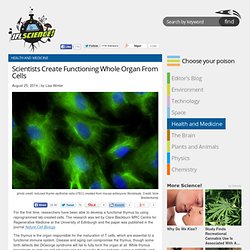
The research was led by Clare Blackburn MRC Centre for Regenerative Medicine at the University of Edinburgh and the paper was published in the journal Nature Cell Biology. The thymus is the organ responsible for the maturation of T cells, which are essential to a functional immune system. Disease and aging can compromise the thymus, though some birth defects like DiGeorge syndrome will fail to fully form the organ at all. While thymus transplants or immune cell infusions can be given for these patients, organ availability and complications with tissue matching do not make it a smooth alternative. Because these problems extend to all donated organs, biologists have been working toward creating custom-made replacement organs using progenitor cells. The researchers first obtained fibroblasts, which are cells within connective tissue, from mouse embryos.